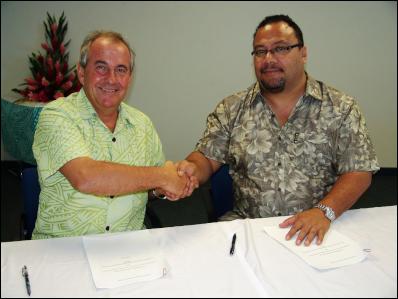Pacific Islands Roundtable For Nature Conservation
The Way Forward For Pacific Islands: Roundtable For Nature Conservation
The Pacific Islands Roundtable for Nature Conservation calls upon Pacific Island countries to commit to investing in natural solutions to reduce the impacts of environmental and climate change as a matter of urgency.
This was one of the outcomes of the 13th gathering of the Roundtable which met in Samoa last week. The Meeting brought together close to 100 nature conservation practitioners and stakeholders who are committed to working together for effective conservation action in the Pacific region.
“Natural Solutions to Environmental and Climate Change in the Pacific” was the theme of the gathering that resulted in a number of outcomes, one of which is a collective commitment to identifying innovative approaches to finance natural solutions, particularly through climate change adaptation funding.
The conference identified key specific areas which it needs to strengthen such as capacity building, communication mainstreaming climate change and natural resource economics.
Natural solutions which lead to the conservation and sustainable use of our island biodiversity are imperative to preparing the Pacific for the uncertainties of environmental and climate change. The discussions over the week looked at how better managing our environment can help us adapt to the impacts of climate change.
“I think it’s the realisation or the reaffirmation that the work we are doing to conserve biodiversity is important for adaptation,” said Taholo Kami, Chair of the Pacific Islands Roundtable for Nature Conservation and IUCN Oceania Regional Director.
“Healthy ecosystems are critical for adaptation in small Pacific Island countries and what we are doing now needs to be done better in terms of investing in biodiversity, investing in conservation and trying to keep relatively intact ecosystems.”
The world is in a biodiversity crisis. Even as the global community celebrates the International Year of Biodiversity it is clear that we have failed to meet the global 2010 target to halt the rate of biodiversity loss.
In the Pacific, the region works together on nature conservation under the guiding principals of the 2008 – 2012 Action Strategy for Nature Conservation and Protected Areas in the Pacific Islands Region. The Strategy charts a five year course for concerted action to protect the species and ecosystems that form the foundation of Pacific culture and livelihoods and serves as the guiding framework for member organisations of the Pacific Islands Roundtable for Nature Conservation.
Over the course of the past week, the Working Groups of the Roundtable looked at a range of nature conservation issues including Protected Areas, Invasive Species and Marine Conservation. The thematic Working Groups are the implementing mechanism of the Roundtable, ensuring on-ground activities that support national conservation priorities. There were also specific working groups to look at strengthening links with regional initiatives such as the Coral Triangle Initiative, Pacific 2020 as well as a country-specific working group for capacity building in PNG.
Government representatives from Fiji, Federated States of Micronesia, Kiribati, Papua New Guinea, Solomon Islands, Tonga and Vanuatu were also present at the meeting as part of the peer review learning on the Programme of Work on Protected Areas.
“The Roundtable is a great idea that provides a mechanism for keeping the energy of the Nature Conservation Conference alive,” said David Sheppard, Director of the Secretariat of the Pacific Regional Environment Programme (SPREP), which hosted the 13th Meeting of the Roundtable. ”The meeting nurtures networking and friendships while providing a forum for good technical discussion”.
He added that the involvement of non-government and government in a neutral forum was very positive for building innovative solutions for conservation and adaptation.
“The next steps will be to take some of the key recommendations from this meeting to the SPREP annual general meeting in September and also to link it with other processes. All this will lead up to the next four-yearly Nature Conservation Congress on 2012 and follow through to on the ground actions addressing national priorities and needs”, he said.
The next Pacific Islands Roundtable for Nature Conservation Meeting will be in 2011 which the French Marine Protected Area Agency has offered to host.

Mr David Sheppard and Mr. Taholo Kami
ENDS


 World Economic Forum: Future Of Jobs Report 2025 - 78 Million New Job Opportunities By 2030 But Urgent Upskilling Needed To Prepare Workforces
World Economic Forum: Future Of Jobs Report 2025 - 78 Million New Job Opportunities By 2030 But Urgent Upskilling Needed To Prepare Workforces Pasifika Medical Association: PACMAT Continues Efforts In Vanuatu Earthquake Response
Pasifika Medical Association: PACMAT Continues Efforts In Vanuatu Earthquake Response Global Jews for Palestine: Call From Jewish Groups Across The Globe: Tell Your Political Representatives Now- UNRWA Is Urgent
Global Jews for Palestine: Call From Jewish Groups Across The Globe: Tell Your Political Representatives Now- UNRWA Is Urgent Save The Children: GAZA - New Year Begins With More Children Killed By Israeli Airstrikes
Save The Children: GAZA - New Year Begins With More Children Killed By Israeli Airstrikes OHCHR: UN High Commissioner For Human Rights Volker Türk On Abolition Of Death Penalty In Zimbabwe
OHCHR: UN High Commissioner For Human Rights Volker Türk On Abolition Of Death Penalty In Zimbabwe APEC: Building A Sustainable Tomorrow - APEC Returns To Korea After 20 Years
APEC: Building A Sustainable Tomorrow - APEC Returns To Korea After 20 Years